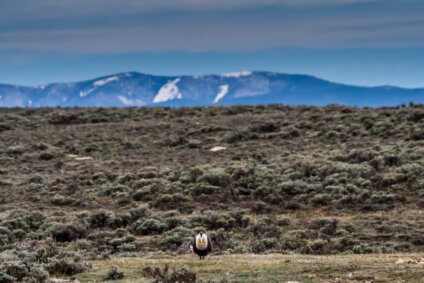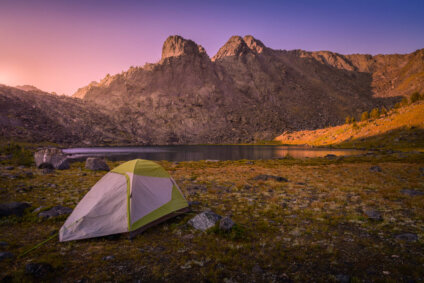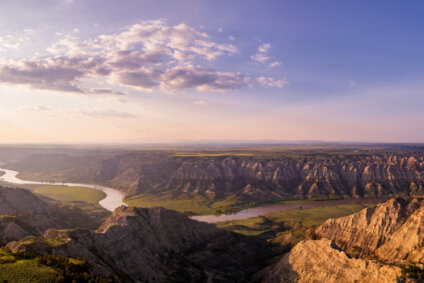Power in Unity
How we overcame enormous odds to achieve historic wins for public lands at the 2023 Montana State Legislature

It’s easy to believe Russell Fruits when he says, “I’m not very good at sitting on my hands.”
The father of three is taking a break from building a wood-fired pizza oven with one of his daughters. He’s quick to rattle off a list of everything that keeps him and his family busy – hunting and fishing, hiking, camping, floating, rock climbing, foraging for morels and huckleberries – and almost as quick to segue from his love of Montana’s wild public lands to his commitment to advocating for them.
“There’s a reason we came to Montana,” says Russell, who moved with his family to the Helena area a few years ago. “A lot of that was for the outdoors, for nature. Helping to preserve what’s already here is pretty high on my family’s priority list. We like to be involved, and we don’t sit back very easily.”
“The decisions that we make today are going to set the tone for decades.”
– Russell Fruits

Russell’s passion for the outdoors and commitment to action exemplify the spirit of our community of advocates, which has rarely been more necessary than it was during the 2023 Montana Legislature. Wild Montana members and supporters stood up time and again to a supermajority that oversaw the request and introduction of more bills than in any other session over the last 50 years, many of which threatened public lands and waters, wildlife, public access, and Montanans’ constitutional right to clean air and water. With the committed help of Russell and thousands of other members and supporters, Wild Montana led the charge that defeated these bad bills. But we didn’t just play defense. We brought together the vast majority of lawmakers, from both sides of the aisle, and passed the state’s most ambitious public land funding bill to date.
Wild Montana members and supporters made all our successes possible. Spearheaded by members of the Legislative Action Team, our crack squad of rapid-response advocates, they contacted legislators over 8,500 times, wrote op-eds and letters to the editor, testified in front of numerous committees, and supported efforts to pass good public lands bills, defeat bad ones, and keep public lands at the top of the agenda.
A legislative session that started with the odds stacked against public lands and waters turned into one of the most successful sessions we’ve ever engaged in, again proving our unique ability to unite and mobilize people and communities on behalf of the places that make Montana special.
“I stand here today encouraging all of my fellow Montanans to appreciate what brings us together and to value it more than what tears us apart.”
– Hannah Muszkiewicz

The attacks on public lands and waters began before the legislative session even started, when one lawmaker proposed a constitutional amendment targeting Montanans’ right to “a clean and healthful environment.” That right has undergirded over 50 years of environmental progress, during which Montana shed copper king-era laws to avoid repeats of the sorts of environmental disasters – like the Berkeley Pit, Anaconda Smelter, Silver Bow Creek, Milltown Dam, and asbestos sites in Libby – that were all too common in times past, disasters that Montanans are still suffering from and paying to clean up.
Opposition to the proposed amendment was overwhelming, crescendoing at the Rally for Public Lands. On a frigid February day, hundreds of public land advocates braved icy roads, snow, and subzero temperatures to gather on the steps of the State Capitol and call on legislators to defend the right to clean air, clean water, and healthy public lands safeguarded by the constitution since 1972. Rally goers spontaneously chanted “It’s our right! It’s our right!” while holding signs demanding protection for public lands.
Activist and educator Hannah Muszkiewicz captured the spirit of the day.
“Look around you!” she said, as news cameras rolled and legislators watched from the windows. “We are fortunate beyond words to get to experience the magical gifts of this environment. I will not take that fortune for granted, not for a single second, which is why I stand here today encouraging all of my fellow Montanans to appreciate what brings us together and to value it more than what tears us apart.”
Such was the groundswell of opposition that anti-public lands legislators never even mustered the support within the Legislature to formally introduce the constitutional amendment. Because of public land advocates’ passion and commitment, almost every legislator in the building realized that amending the constitution wasn’t just unpopular, but a political liability they wouldn’t touch with a 10-foot pole.
Public land advocates celebrated defeating the proposed amendment, but the bad bills didn’t stop there. Lawmakers kept up a steady stream of anti-public lands legislation, including several bills that would have kneecapped Habitat Montana, the state’s flagship conservation and public access program; two that would have forced local communities to allow e-bikes on nonmotorized state and local trails; one banning permanent conservation easements; and one seeking to overturn Montanans’ right to access rivers and streams.
We defeated all of them.
The wins kept coming. Our work on budget bills helped secure another $4 million for trails, $5 million for investments in riparian areas along the lower Yellowstone River, $12 million for additional habitat conservation and access programs, and enough money to support new state employees with the job of helping reform wildfire policy and execute approved conservation projects. These investments will pay off in healthier lands, waters, and wildlife; better public access; well-maintained trails; improved public facilities; and more.
“This stuff isn’t sexy, but it’s hugely important,” says Noah Marion, Wild Montana’s political and state policy director. “When advocates contact lawmakers, testify, and just show up, it makes it impossible for legislators to ignore how important conservation is to Montana voters. Our budget reflects our priorities, and when we make it really clear that conservation is one of those priorities, guess where the money goes?”
While polarization dominated the headlines, we leaned into the collaborative approach that’s served us well for over 60 years. Making the most of the relationships we’ve built across the aisle and around the state over the last several years, we united 130 legislators from both sides of the aisle, over 100 organizations, and thousands of Montanans behind Senate Bill 442.
Sponsored by Sen. Mike Lang, R-Malta, SB 442 invests over $30 million every two years in habitat conservation, state parks and trails, among other things. The money comes from recreational marijuana tax revenue, as Montana voters intended when they voted to legalize recreational marijuana two years ago. The bill will also provide funding for county road maintenance, veterans’ services, and private land conservation, which is why it enjoyed the support of a broad group that included the Montana Association of Counties (MACo), agricultural organizations, organized labor, and veterans’ groups.
Noah played a major role in developing and passing SB 442. He was in the Capitol every day extolling the benefits of investing in conservation and building a bipartisan coalition that resoundingly passed one of the most impactful pieces of Montana conservation legislation in decades.
“The bottom line is that investing in public lands and public access is just popular, no matter what your politics are or where you live,” he says. “Regular folks made it really clear that they believe in investing in public lands, and they didn’t leave any doubt that conservation is a winning issue in Montana. SB 442 is the most collaborative bill I’ve ever seen in the Montana State Legislature, and it’s a testament to the popularity of conservation and the willingness of public land advocates to make it clear to legislators that they wanted this bill passed.”
“Our budget reflects our priorities, and when we make it really clear that conservation is one of those priorities, guess where the money goes?”
– Noah Marion

Jason Rittal, deputy director of the MACo, worked closely with Noah and others to shape SB 442. MACo’s priority was securing funding for county road maintenance, and while 442’s final form wasn’t exactly what Jason envisioned, he says a widespread commitment to honest collaboration made possible a bill that benefits everyone.
“When we started [negotiating on SB 442], we were actually looking to take away Habitat Montana dollars and use them for county roads,” he remembered. “We knew we’d need to cooperate, and eventually we got to a point of ‘OK, this bill is for the greater good. This is a good compromise. Everybody can win in this.’”
Jason’s quick to praise Noah’s work guiding SB 442 and optimistic that the bonds developed during the session will pay off down the road.
“I’m proud of the relationships we built,” he says. “We’re not going to agree on everything all the time, but I know that when I talk to [Noah and representatives of other conservation organizations], they’re going to give me honest answers. If they say they’re going to do something they’re going to do it. That bodes well for all of us going forward.”
With Montanans’ support, the House passed SB 442 82–17. The Senate passed it 48–1. Then something inexplicable happened: the day after the bill cleared its final hurdle in the Legislature, Gov. Greg Gianforte vetoed it.
In an apparent attempt to obstruct the Legislature’s authority, the governor failed to properly communicate his veto to the Senate before it adjourned, preventing lawmakers from having the chance to override the veto.
When the governor refused to uphold his duty, we responded by filing suit against him and the secretary of state to compel them to comply with their obligations under the Montana Constitution and allow the Legislature the opportunity to override the veto. (At the time of writing, we anticipated proceedings would begin in mid-August.) Russell, a member of the Action Team, is one of many who saw historic value in SB 442 and was left seriously disappointed by the governor’s veto.
“SB 442 is such a good opportunity to invest in conservation, and more besides,” he says, referencing the bill’s commitment to provide additional funding for substance abuse services and veterans’ programs as well as public lands. “I’d rather see it spent on something – or several things – that are going to improve the quality of life for all Montanans, and conservation is one of those things. It had so much buy-in from so many members of the public.” Russell sees our successes against the odds in the 2023 Legislature as fuel for hope.
“We need to stand up for the important things now,” he says. “The decisions that we make today are going to set the tone for decades, and I’m optimistic that [conservation advocates] will keep building our track record of success. People in the Legislature are looking at Wild Montana, at all these grassroots advocates, and saying, ‘Oh yeah, these people carry a lot of weight. These are strong voices, these are strong partnerships.’”
We’re committed to building on those successes and setting ourselves up for even more historic victories in the 2025 legislative session and beyond. You can jump start your advocacy by signing up for the Legislative Action Team, where you’ll join 1,500 other public lands supporters to hold lawmakers accountable and defend our public lands and waters, now and into the future.
This story was originally published in the Summer 2023 Wild Montana Newsletter. You can read the full newsletter in PDF format here.
Stay Connected
"(Required)" indicates required fields


